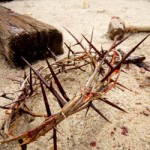 Surely he has borne our griefs (lit. sicknesses) and carried our sorrows (lit. pains); yet we esteemed him stricken, smitten by God, and afflicted. But he was wounded for our transgressions; he was crushed for our iniquities; upon him was the chastisement that brought us peace, and with his stripes we are healed. All we like sheep have gone astray; we have turned every one to his own way; and the LORD has laid on him the iniquity of us all. – Isaiah 53:4-6
Surely he has borne our griefs (lit. sicknesses) and carried our sorrows (lit. pains); yet we esteemed him stricken, smitten by God, and afflicted. But he was wounded for our transgressions; he was crushed for our iniquities; upon him was the chastisement that brought us peace, and with his stripes we are healed. All we like sheep have gone astray; we have turned every one to his own way; and the LORD has laid on him the iniquity of us all. – Isaiah 53:4-6
My friend, Dr. James White once wrote, “One of the most eloquent testimonies to the error of Dan Brown and the ridiculous and outrageous claims of The Da Vinci Code regarding the “creation” of the deity of Christ by Constantine is found in the sermon on the Passover preached around twenty years before the end of the second century by Melito, bishop of Sardis. I included my translation of this tremendous section in my book, The Forgotten Trinity, and reproduce it here. Remember, this sermon was preached approximately 145 years prior to Nicea, 130 years prior to Constantine’s battle at the Milvian Bridge (where he allegedly saw the sign of the cross in the sky and the phrase, “in this sign, conquer”). As you read these words, rejoice, as I rejoice, at the thought of this ancient believer and the fact that he reveled in the truth about the God-man Jesus Christ just as we do today! Oh that we had more preaching like this in our land today!”
And so he was lifted up upon a tree and an inscription was attached indicating who was being killed. Who was it? It is a grievous thing to tell, but a most fearful thing to refrain from telling. But listen, as you tremble before him on whose account the earth trembled!
He who hung the earth in place is hanged.
He who fixed the heavens in place is fixed in place.
He who made all things fast is made fast on a tree.
The Sovereign is insulted.
God is murdered.
The King of Israel is destroyed by an Israelite hand.
This is the One who made the heavens and the earth, and formed mankind in the beginning,
The One proclaimed by the Law and the Prophets,
The One enfleshed in a virgin,
The One hanged on a tree,
The Oneburied in the earth,
The One raised from the dead and who went up into the heights of heaven,
The One sitting at the right hand of the Father,
The One having all authority to judge and save,
Through Whom the Father made the things which exist from the beginning of time.
This One is “the Alpha and the Omega,”
This One is “the beginning and the end”
The beginning indescribable and the end incomprehensible.
This One is the Christ.
This One is the King.
This One is Jesus.
This One is the Leader.
This One is the Lord.
This One is the One who rose from the dead.
This One is the One sitting on the right hand of the Father.
He bears the Father and is borne by the Father.
“To him be the glory and the power forever. Amen.”
The cross was no accident, but the center point of a plan devised by God before time began. The plan culminated in a divinely ordained exchange which would take place at Calvary. All the wrath and punishment due to us for our sinfulness was to come upon Jesus; and the good due to Jesus due to His sinless obedience was to come upon us. The innocent would bear the just punishment of the guilty, and the guilty would receive all the benefits due to the just.
I remember more than two decades ago, hearing a sermon regarding this divine exchange. What I heard still affects me greatly today. For His glory, and out of His love for us, God met all of our needs at the cross: spiritual, mental, emotional, physical, material, financial, temporal and eternal. As we think about these eight declarations concerning what Christ achieved for His people in His death, burial and resurrection, let us celebrate the perfect and finished work of the perfect Savior:
1. Jesus was punished so that we might be forgiven (Is. 53:4, 5)
2. Jesus was wounded so that we might be healed (Is. 53:4, 5; 1 Pet. 2:24)
3. Jesus was made sin with our sinfulness that we might be made righteous with His righteousness (2 Cor. 5:21)
4. Jesus died our death so that we might share His life (John 10:10; Rom. 6:6, 7; Gal. 2:20)
5. Jesus was made a curse so that we might receive the blessing (Gal. 3:13, 14)
6. Jesus endured our poverty that we might share His abundance (2 Cor. 8:9)
7. Jesus endured our shame that we might share His glory (Ps. 69:7; Is. 53:3; Heb 12:2; Heb. 2:10)
8. Jesus endured our rejection that we might share His acceptance (Matt 27:45-47; Eph. 1:3, 4)
